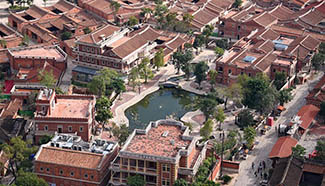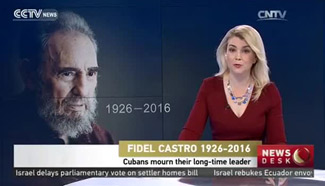By Michael Place
RIO DE JANEIRO, Dec. 4 (Xinhua) -- There were no scenes of panic in the moments before the plane crash that wiped out a Brazilian football team in Colombia last week, according to one of the survivors.
Bolivian flight attendant Erwin Tumiri was one of only six people pulled alive from the wreckage of the LaMia airlines charter plane that crashed into a hillside near Medellin last Monday.
Seventy-one people died in the crash, including 19 players from Brazilian top-flight club Chapecoense and all of its coaching staff.
"We were told it would be a normal landing," Tumiri told Brazil's Globo TV in an interview broadcast late on Sunday.
"I was talking with the [Chapecoense] coach [Caio Junior] and he was teaching me some Portuguese. I told everybody to put on their seatbelts because we were about to land.
"Everybody went back to their seats. The lights went out and then the plane began to shake. I thought that the vibration was part of a normal landing. But it wasn't. I just heard a 'vroom vroom' sound. I can't remember what happened after that. I woke up on the ground."
Investigations into the accident are expected to take months, but pilot Miguel Quiroga is known to have told air traffic officials that the plane had run out of fuel just seconds before it came down.
Quiroga, who died in the crash, had been ordered to maintain a circular holding pattern while another plane with mechanical problems was given priority to land.
Many have questioned how the flight was authorized when its journey from the Bolivian city of Santa Cruz to Colombia's Rionegro airport was the same as the plane's maximum fuel range.
Tumiri confirmed media reports that the plane had been due to stop for refuelling in the northern Bolivian city of Cobija.
A delay in the flight's departure from Santa Cruz meant the stop could not be made because Cobija's airport did not operate at night, according to Globo.
Tumiri did not point the blame at the pilot or LaMia, but said flight staff should have been told of the situation.
"I think it wasn't a good idea by the pilot to take that decision or the person responsible at LaMia," Tumiri said.
"They [airline companies] should let us be heard. Right now it's, 'This is how it is and it's going to be like this.' Decisions like that shouldn't be taken in an individual way. And it should be communicated: where we are going, where we are going to refuel, and these things. The flight staff need to know. The responsibility should be divided and then a leader can make a decision."
Bolivian authorities have suspended LaMia's operating licence and president Evo Morales has promised a full investigation.










